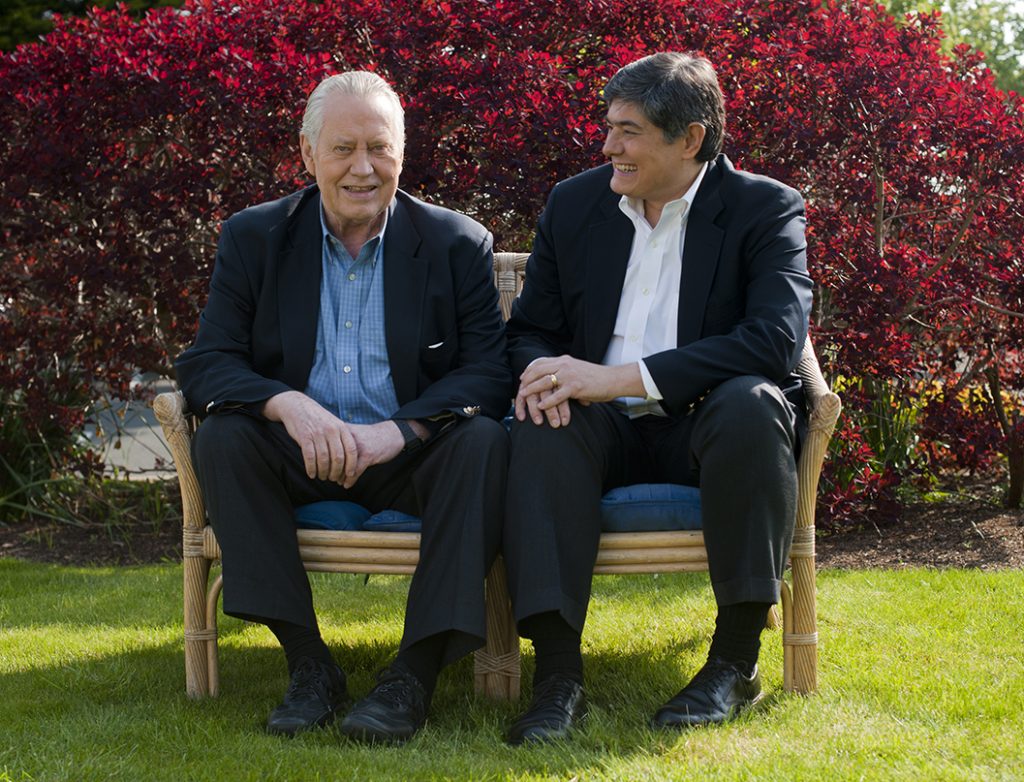Chuck Feeney’s Legacy Lives on as Philanthropic Fund Winds Down
Resource type: News
Irish Independent | [ View Original Source (opens in new window) ]

By Ailish O’Horaand
Programme leaders from Trinity College Dublin met their benefactor – philanthropist and former billionaire Charles ‘Chuck’ Feeney – at the Global Brain Health Institute conference in San Francisco last week. They were among 70 programme leaders who gathered together from across the globe.
The Global Brain Health Institute (GBHI) is a collaboration between Trinity and the University of California San Francisco.
It is funded by Feeney’s private fund – Atlantic Philanthropies (AP) – which has given over €6.5bn away to causes ranging from health and education to human rights, including numerous schemes in Ireland over the past 30 years.
The purpose of the San Francisco meeting was to bring together leaders from the Atlantic Fellows programmes from around the world in a bid to promote a fairer society.
“The work of the global community of Atlantic Fellows represents what Chuck Feeney’s philanthropy is all about: bringing good people together to build fair and healthy societies,” said Chris Oechsli, AP’s chief executive, to the Sunday Independent.
As of now, there are 337 Atlantic fellows from 64 countries.
Over two decades the global network of Atlantic Fellows will grow to nearly 3,000, working around the globe to advance fairer, healthier, more inclusive societies.
From education and research to human rights and healthcare, certainly Feeney’s legacy lives on in Ireland – be it from a community centre in Dublin’s Darndale to Glenstal Abbey in Limerick.
His first visit to Ireland was a tour of Shannon Airport and that was when his interest in the Northern Irish conflict began.
However, he also noticed that the pace of educational development in Ireland was not up to scratch.
But the biggest change came in 1998 when The Programme for Research in Third Level Institutions (PRTLI) was agreed with Atlantic Philanthropies and the-then newly-elected Taoiseach Bertie Ahern.
The figures were impressive: Trinity foundation €207m, University of Limerick Foundation €103m, DCU €118m, Cork University €90m, Galway University €67m – and the funds were matched by the Government.
With a focus on funding at third level, there was a feeling in the organisation that the emphasis was on supporting the privileged – so it was decided that the spending would spread further afield and the foundation would “spend itself out of existence” in keeping with Feeney’s commitment to “giving while living”.
Four areas of Irish life were then identified for future grants: early childhood, young health, ageing and human rights.
AP in Ireland is in wind-down mode now, although some of the projects will continue including the GBHI in Trinity as well as a number of other initiatives including childcare and mental health.
It held its last board meeting here in March, said Oechsli, but there is still activity. And he said the foundation is keen to help promote the philanthropy of the future, emulate the work of Feeney and encourage the Government to back projects and programmes.
“We think one of the roles of the philanthropist is to provide evidence of projects that work and that could be taken up by Governments.
“However, unlike Governments, philanthropy can take risks and be more entrepreneurial but the end goals are much the same.
“But governments have greater resources and the ability to shape systems – social and health systems.
“AP doesn’t pretend to be the experts in any of this, but it does support thoughtful, innovative leaders who have ideas for effective change,” he said. He added that philanthropy embodies certain attributes and values, seeking out the best people and the best in people.
“People who were dedicated to more than themselves, whether it would be in health, innovation, reconciliation and collaboration. They are some of the qualities he [Feeney] has and that have underpinned the work of the foundation.”
While Irish people are known for their compassion and generosity, we are not necessarily a nation of philanthropists.
But there is plenty of scope here, according to Oechsli.
“There are a number of emerging business leaders, both at home and abroad, amassing considerable wealth. We’re not in a position to tell people what to do, but we are eager to share our experience,” he said.
Certainly, Feeney and AP have inspired a number of impressive philanthropists, including Microsoft founder Bill Gates and investor Warren Buffett.
The timing of the wind-down is poignant, given the backdrop of the Brexit situation and Feeney’s role in helping to secure the ceasefire in Northern Ireland and the historic Belfast/Good Friday Agreement in 1998.
Feeney is keenly aware of the travails in the world today from Brexit and Donald Trump’s US presidency to the Rohingya crisis, according to Oechsli. “These are the challenges we find today. Whether it’s Brexit, the US leadership or the Rohingya, these are the issues of our time,” Oechsli said.
Home for Feeney and his wife Helga nowadays is a modest, rented apartment in San Francisco.
“It is a very simple and modest existence, but he loves to be engaged and loves to talk,” Oechsli added.